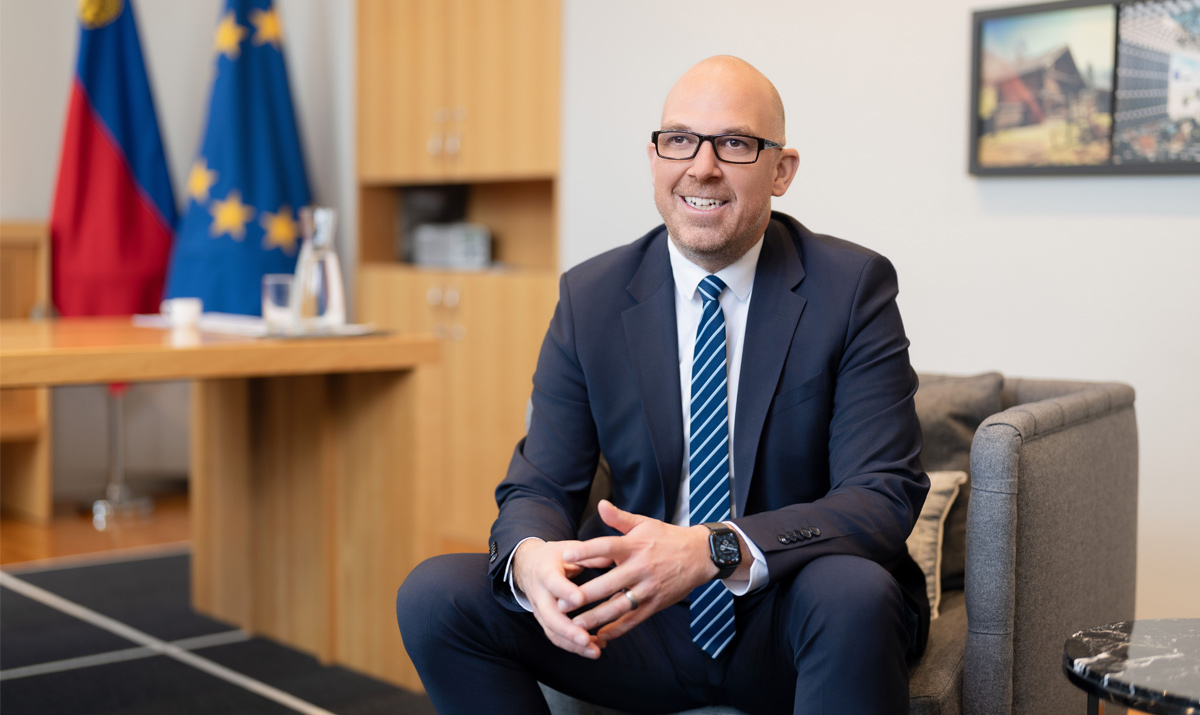
30 Oct Interview with Daniel Risch, Prime Minister, Liechtenstein
What factors have allowed for the continued growth of Liechtenstein’s economy despite recent challenges?
Our long-standing customs and currency union with Switzerland, now over 100 years old, has helped us manage inflation better than many other countries. While some export-oriented companies faced challenges, our inflation rates remained low. Another key factor in stabilizing our economy is our diversified industrial and financial sectors, which provide a stable foundation during crises. A crisis rarely affects every sector equally; some companies perform well even during difficult times. We prioritize creating favorable conditions for businesses without too much government interference. We believe entrepreneurs should have the freedom to run their businesses independently. This approach has been a cornerstone of our policy for decades. As for international credibility, our strong rating from S&P reflects our stability. Our AAA rating and a stable outlook speak to our financial health. A significant achievement was becoming a member of the International Monetary Fund (IMF), which took place in October 2024. Joining will have additional benefits in the coming years.
What is the government currently doing to update policy to support a brighter economic future?
Like many Liechtensteiners, I am a proud European and a supporter of strong ties to the European Union and European countries. We are very comfortable with our position in the European Economic Area (EEA) alongside Iceland and Norway. This allows us to participate in the European single market and enjoy its freedoms while not officially being EU members, which suits us well. Being part of the EEA means that around 12,000 EU laws apply to Liechtenstein. Much of our focus is on implementing EU regulations rather than creating new legislation. For example, the Liechtenstein Blockchain Act that took effect in 2020 was a milestone that is now aligned with EU standards. We are currently overhauling our banking legislation, which dates back to the 1990s. We aim to align with international standards rather than making groundbreaking changes.
Looking ahead, we aim to reform our justice system, with hopes to finalize this by December 2024. Sustainability has been a key focus for the government since we developed our program at the start of the term. Our approach to sustainability goes beyond ecological aspects; we aim to ensure balance in all areas. We emphasize sustainability across four areas: economic, ecological, social and financial. Each ministry has worked to advance these priorities. For instance, our IMF membership supports our fiscal prudency, gives us more visibility and provides us with the option of being a lender in times of crisis. Transparency is also crucial for us. We created a website that provides regular updates on our achievements and where people can track our progress on each goal in our development program. This open communication is important to keep the public informed – especially in times when we see institutional trust eroding in many countries.
What unique attributes define Liechtenstein’s industrial ecosystem?
Liechtenstein houses many world-leading industrial companies such as Hilti, Thyssenkrupp Presta, Neutrik, Kaiser and Ivoclar – all of which started as small and medium-sized enterprises in Liechtenstein and now have operations in the USA. Our approach is to leverage our small size to stay close to entrepreneurs and CEOs, understand their needs, minimize bureaucracy and allow them to innovate. As a small country without natural resources such as oil, our strength lies in having direct and efficient communication channels; our best natural resource is fast and direct access. Entrepreneurs from other countries often find it remarkable how quickly they can get clear answers here — sometimes within hours or days. For us, this closeness is normal. It is crucial in fostering a supportive environment for businesses to thrive.
How significant is the USA as an economic partner for Liechtenstein?
The USA is a crucial market for us — not just for exports but also for manufacturing. Our companies have made significant investments in the USA for decades. Politically, our relations have also strengthened, thanks in part to the efforts of our ambassador in Washington and US Ambassador Scott Miller in Bern. Our foreign minister, Dominique Hasler, signed a Memorandum of Understanding in the summer to deepen cooperation between the two nations. The first strategic dialogue between our countries already took place in Washington D.C. We are closer to the USA today than ever before; we value the partnership between our two unequal yet like-minded nations who believe in free societies and free economies. We have a very strong partnership with much potential in the future.
How open is Liechtenstein to foreign participation and investment?
Liechtenstein is open to entrepreneurs and investors. Many of our successful companies are family-owned and not publicly traded, which can be a drawback for some investors. However, there are many opportunities to invest in the country. Thanks to our customs union with Switzerland and our treaty with the European Economic Area, businesses in Liechtenstein have direct access to both the Swiss and EU markets. This unique gateway positions us as an attractive business hub in Europe.
What was behind your decision to not participate in the upcoming elections in 2025?
I often say we try to run our country with an entrepreneurial spirit, always asking if we are still the best fit for the job or if it’s time to pass the torch. After eight years in politics, I decided it was time for new leadership. I could have stayed another year or two, but I felt it was better for both myself and the country to step back now. I was involved in selecting new candidates in my party and believe we have a strong team ready for re-election. For me, stability doesn’t mean holding on tightly—it’s about progress and knowing when to move forward. It’s better to leave when people would rather you stay than to wait until they think it’s time for you to go.
